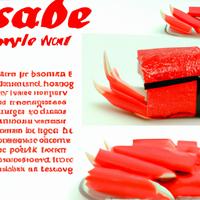
1 serving (28 grams) contains 27 calories, 2.0 grams of protein, 0.6 grams of fat, and 4.2 grams of carbohydrates.

Log this food in SnapCalorie

Nutrition Information
Calories |
225.4 | ||
|---|---|---|---|
% Daily Value* |
|||
| Total Fat | 4.7 g | 6% | |
| Saturated Fat | 1.2 g | 6% | |
| Polyunsaturated Fat | 0 g | ||
| Cholesterol | 47.5 mg | 15% | |
| Sodium | 1696.6 mg | 73% | |
| Total Carbohydrates | 35.6 g | 12% | |
| Dietary Fiber | 0 g | 0% | |
| Sugars | 14.2 g | ||
| protein | 16.6 g | 33% | |
| Vitamin D | 0 mcg | 0% | |
| Calcium | 47.5 mg | 3% | |
| Iron | 0.7 mg | 3% | |
| Potassium | 237.3 mg | 5% | |
* Percent Daily Values are based on a 2,000 calorie diet. Your daily values may be higher or lower depending on your calorie needs.
Food Attributes
Source of Calories
About Artificial crab stick
Artificial crab stick, often known as imitation crab or surimi, is a seafood product designed to replicate the taste and texture of crab meat. Originating in Japan, it is made primarily from white fish, such as pollock, that is finely minced and mixed with starches, flavorings, and sometimes egg whites or oil. This mixture is then shaped, colored, and cooked to resemble crab leg meat. Imitation crab is popular in sushi rolls, salads, and casseroles due to its affordability and versatility in both Asian and Western cuisines. While low in fat and calories, it often contains added sugars, sodium, and preservatives, which may be a concern for some dietary plans. Additionally, it typically has less protein compared to real seafood and may not provide the same level of nutrients, including omega-3 fatty acids. Always check labels for allergens like wheat or gluten, commonly found in some versions.



